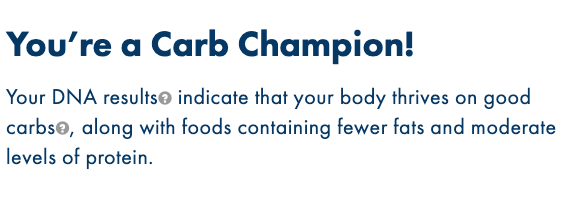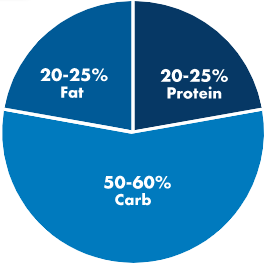I had the opportunity to attend a continuing education session about Nutrigenomics that was sponsored by Nutrisystems®. Dr Tim Church (Medical Director, Genetic Direction) and Courtney McCormick (a registered dietitian with Nutrisystem®, Inc) spoke about how nutrigenomics and personalized nutrition could become enhanced tools for weight loss.The following is my reflection of the information shared.
Current dietary guidelines are used established to assist policymakers, as well as nutrition and health professionals, to recommend a dietary pattern that supports health and offers reduced risk of disease. The guidelines are based on the current body of evidence from human nutrition research. Nutrigenetics, or nutrigenomics, may be able to help us create more meaningful advice by providing personalized dietary guidelines based on an individual’s genetic make up.
Nutrigenomics is the study of how genetics influences metabolism and dietary response and the role of nutrients and bioactive food compounds in gene expression.
Interest in this technology is growing by leaps and bounds. In 2017, the Direct-to-Consumer genetic testing market for tools such as Ancestry® DNA and 23andMe®, was 117 million dollars. It’s estimated that by 2026, this will rise to 611 million dollars. There’s also consumer interest in personal genetics and how what you eat specifically could impact any real risk of disease.
The quick growth in this area is partly due to the reduction in costs associated with genetic technology. This technology is much more available due to the huge reduction in costs over the past ten years. To put this in perspective, consider that in 2001 the “cost per genome” was 100 million dollars. It’s now less than one thousand, according to the National Human Genome Research Institute. A 2005 genotype sample may have cost 1500 dollars to produce, while a 2018 sample only cost 50 dollars.
Research has exploded in this area over the past twenty years as well. In 1995 there were about 100 publications per year on the topic of weight loss genetics. In 2015-1017 there were several hundred per year. Between the lower costs and the advanced science, we are going to continue to see more genetic testing applications in the future.
The Future of Personalized Nutrition
Nutrisystem® now offers a personalized dietary plan based on a your DNA (DNA Body Blueprint™), and they sent me a free DNA Body Blueprint™ to try out earlier this year. Here’s how it worked:
- I received a packet in the mail required several saliva samples to send back.
- I created a profile at Nutrisystem.
- Once my DNA was analyzed I received a report and a personalized diet plan based on my DNA.
Several other dietitians I know also took the test, and they all agreed that it was pretty spot on. It included personalized nutrition, information about your body’s metabolism, food breakdown, fitness tips based on your DNA, vitamins and minerals in which you may not process well, and eating behavior tips based on your DNA profile.
The test uses a gene mapping system that only looks at certain parts of certain genes, in this case, genes related to obesity (in the ancestry type of analysis, the SNPs would determine genetic similarity to your parents and family). Scientists have analyzed these SNPs (Single nucleotide polymorphisms – “snips” for short) to determine which ones relate to what type of disease. The SNPs are variations in the DNA sequence. I am not a geneticist, so I don’t fully understand how this works, but I do know there is good science to support the process.

My results included my need for carbs.
In my case I was happy to know I am a carb-burner, but my body isn’t great at processing fat. I also learned that my body responds well to resistance exercise but doesn’t burn fat efficiently with cardio (I love weight lifting, and I’ve always been able to do push ups. In all the years I ran, I enjoyed it, but could never increase my speed much, and I’ve always had a higher body fat percentage, no matter my weight). It also told me what I suspected – I am not caffeine-sensitive! I process caffeine, normally, while others process it more slowly (yep, I’m one of those people who can drink coffee before bed and still sleep).
Of course I happen to be a dietitian, so I’ve prescribed myself dietary parameters over the years, and they look exactly like what my DNA says they should be. Which begs the question:
“Why not just go work with a registered dietitian for a personalized eating plan?”

The right formula for me.
What Will You Do with this Information?
Going forward, this kind of personalized information can support your goals to stay healthy, eat better, and avoid or put off, disease. But, even when you are armed with the best, and most personalized information – guess what? You still have to make changes and adopt healthier behaviors. That’s right – same old song: You’ll still have to do the work to plan, prepare and eat the right foods, and schedule regular exercise into your life.
Even Dr. Church, who works with a company that develops DNA lifestyle plans said that “genetic testing results aren’t going to solve all of our problems”, it’s simply a better tool for the toolbox. Despite the interest in genetics and personalized medicine and nutrition, we aren’t anywhere near using it as a “solution” to obesity or disease.
However, for many who choose something like the Nutrisystem® DNA Body Blueprint™ program, it’s a helpful guide (especially if you’ve received bad dietary advice in the past) that can point you in the right direction for weight management. Even if it simply affirms what you may already have known (as in my case), make help with motivation. Knowing that your genetic profile says you have “below average” weight loss ability, doesn’t make it any easier to lose weight, but you might be empowered to understand why. Other aspects of the test (such as the vitamin mineral information) may be useful in supporting future weight loss too.
It certainly confirms what registered dietitians have known for decades – there is no one diet that suits everyone. But as Dr. Church suggests, these data sets are just another tool. As they become more affordable, you’ll likely see more of them. The science is there – the results are valid – but you are still the one that has to make behavior changes, or in some cases for instance, accept that your genetics limits your idealistic body image. The more we learn, the clearer it is that we can’t always fight our genes, but it may be useful to know specifically what we can control, and what we can’t.




